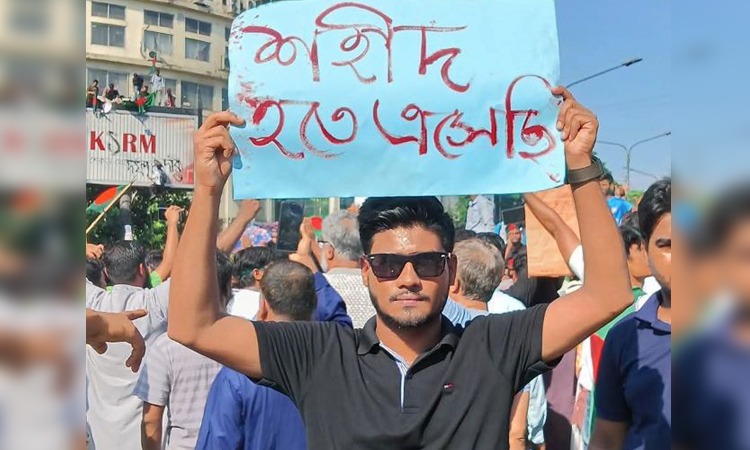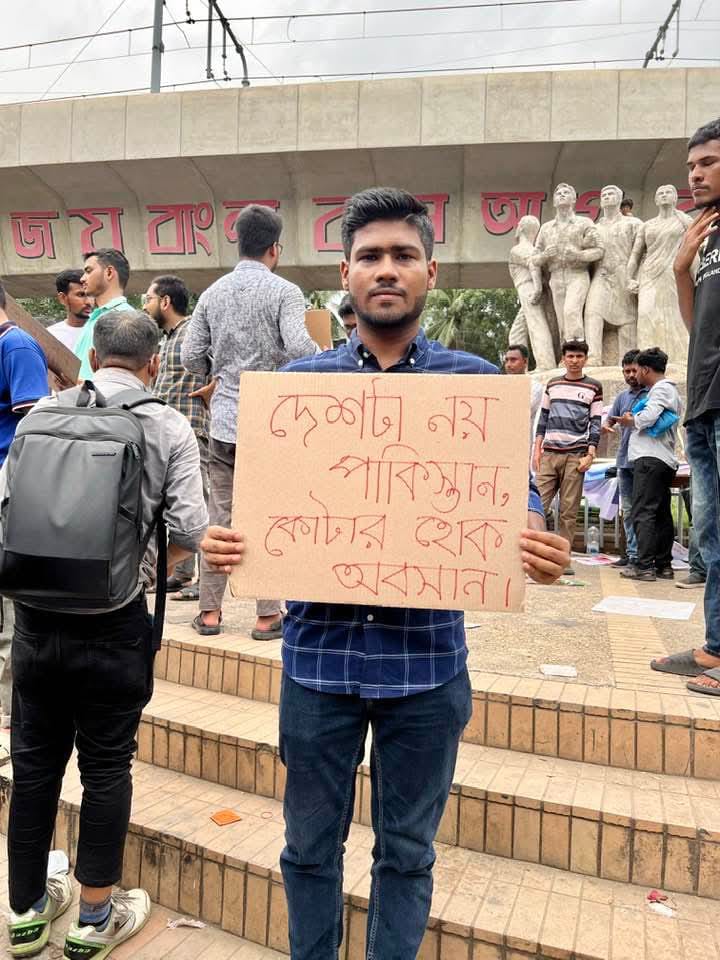News Flash

By Poliar Wahid
DHAKA, July 30, 2025 (BSS) – During the historic July Uprising, thousands of students and mass people across the country rose up in defiance of the autocratic Awami regime, risking their lives to restore democracy in the country.
The people from all corners of the country, the spirit of resistance engulfed the nation, turning campuses and streets into battlegrounds for democratic rights.
Among the frontline organizers of this uprising was Nurul Alam Badhon, Senior Joint Convenor of the Bangladesh Jatiya Chhatra Samaj. Badhon, who had also been active in the 2018 Safe Roads Movement, played a crucial leadership role by mobilizing thousands of students across the country.
Born on October 16, 1997, in Jurain, Dhaka, Badhon is the son of Jahangir Alam and Selina Begum. He is currently a student at the Department of Information Science and Library Management at Dhaka University.
In a recent interview with the Bangladesh Sangbad Sangstha (BSS), Badhon shared his memories from the streets, spoke of the sacrifices made and reflected on the aspirations for a new Bangladesh.
BSS: One year has passed since the July Uprising. Do you still feel the emotions of those days?
Badhon: The July movement was a harrowing experience for all of us. Each day felt like a separate chapter in a painful book. We had to risk our lives every day just to stand our ground. It was a time of terror, sacrifice and courage that will never fade from memory.
BSS: What role did your organization play in the quota reform movement?
Badhon: On June 5, we joined the protest in front of the Central Library against the discriminatory quota system. Following the central committee’s decision, our university branches and district units of Bangladesh Jatiya Chhatra Samaj actively participated across the country.
As a Dhaka University student, I was constantly engaged, along with our convener, Saiful Islam, with the anti-discrimination student movement.
BSS: Could you share a memory from the uprising that you’ve never mentioned before?
Badhon: There are many such memories. At the time, I was a student and also engaged in a job for livelihood. Leading protests on campus and being politically active meant we faced enormous pressure.
Police harassment made it difficult to continue working. Local Awami League-backed goons came to my home multiple times, threatening my family. Police also came looking for me more than once. Those were grim and traumatic days.

BSS: Did you witness anyone become a martyr during the protests?
Badhon: I was mostly active in Shahbagh and Jatrabari, two major t hotspots. Many were killed there.
One such incident I can’t forget was on July 18 in Jatrabari, when Irfan Bhuiyan was martyred by police gunfire right in front of me. That image still haunts me.
BSS: As a July fighter, did you anticipate in advance that Hasina would flee?
Badhon: We had always envisioned Hasina’s downfall. At one point, it became clear this was no longer just about quotas, it had turned into a full-blown mass uprising. As our organization’s leadership, we directed our activists to intensify pressure in areas like Jatrabari and Rampura.
We were determined to bring about her fall. But we never imagined she’d flee the country like a coward.
BSS: Where were you on August 5? When and how did you learn about Hasina’s escape?
Badhan: I was in Keraniganj on August 5. I couldn’t stay at home, so I was hiding at a relative’s house. While heading toward Jatrabari, I received a phone call from my mother. Overjoyed, she said, “Hasina fled by helicopter! You don’t have to hide anymore.” I wept with gratitude and relief. That feeling is impossible to describe.
BSS: What impact did Chhatra League’s attacks have on general students?
Badhon: The July 15 attack on the Dhaka University campus shook the entire country. The brutality of the Chhatra League was too much for people to accept. They even went to students’ homes to issue threats.
But instead of instilling fear, it ignited more resistance. We often feared that people might stop coming to the streets, but every day they surprised us with even greater turnout.
BSS: What role did female students play in the movement?
Badhon: Their role was extraordinary. Especially in Dhaka, female students took to the streets in large numbers. One female protester’s bloodied face on July 15 went viral and outraged the entire nation.
Female students were viciously attacked, and in response, the public rose in fury. Their participation gave the movement renewed momentum. On July 17, when the coffin procession was attacked, students responded by expelling the Chhatra League from the Dhaka University campus.
BSS: The role of Qawmi Madrasa students drew much attention. How do you view their participation?
Badhon: The Qawmi madrasa students’ participation was unmatched and historic. In Jatrabari, they stood unarmed against live bullets. Their contribution must be remembered, no one should forget what they did.
BSS: How did the police and administration behave during the movement?
Badhon: The police acted like Hasina’s private force. Think about it, even after she fled, they kept firing on protesters until the afternoon of August 5. Hundreds were killed in Jatrabari alone. The brutality was beyond comprehension.
Thousands of our fellow fighters were wounded, some blinded and some lost limbs. Their suffering is the price we paid for resisting tyranny. Ironically, the more they fired, the stronger our resolve became.
BSS: What support have you extended to the wounded and families of martyrs?
Badhon: Our party, Bangladesh Jatiya Party (BJP), led by Chairman Barrister Andaleeve Rahman Partho, always stood by the people. Our Secretary General Abdul Matin Saud personally looked after the injured in Jatrabari and Demra.
He remains in constant contact with the injured and their families to this day. Our party has extended all possible support.
BSS: Have the dreams of the July Uprising been fulfilled?
Badhon: A new government is in place after the fall of a tyrannical regime. Of course, it will take time to reflect our hopes across every sector.
But compared to the fascist period, students now have more breathing space on campus, and the political climate is less repressive. That in itself is progress.
BSS: What are your hopes for the new Bangladesh?
Badhon: I dream of a Bangladesh built on equality and humanity, where people of all religions can practice freely simultaneously healthy political culture will be created for establishing democracy.